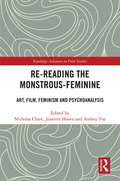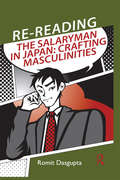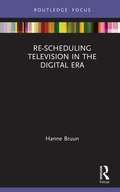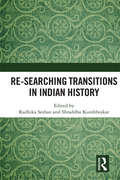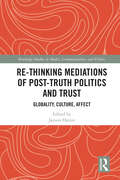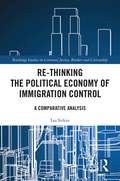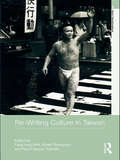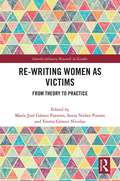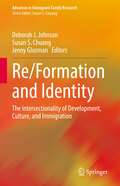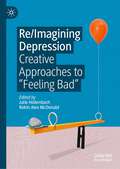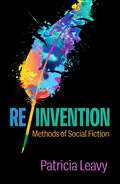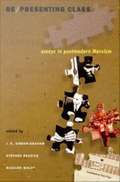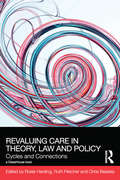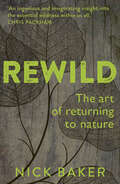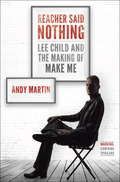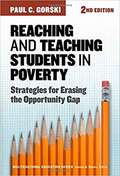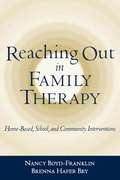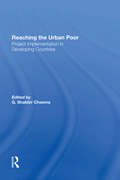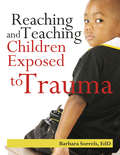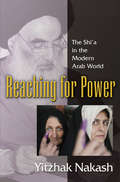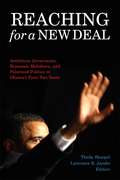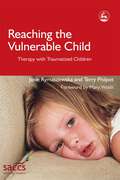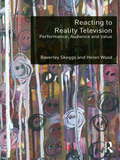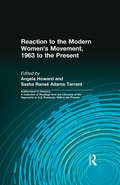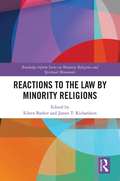- Table View
- List View
Re-reading the Monstrous-Feminine: Art, Film, Feminism and Psychoanalysis (Routledge Advances in Film Studies)
by Audrey Yue Nicholas Chare Jeanette HoornThis book provides a critical reappraisal of Barbara Creed’s ground-breaking work of feminist psychoanalytic film scholarship, The Monstrous-Feminine, which was first published in 1993. The Monstrous-Feminine married psychoanalytic thinking with film analysis in radically new ways to provide an invaluable corrective to conventional approaches to the study of women in horror films, with their narrow emphasis on woman’s victimhood. This volume, which will mark 25 years since the publication of The Monstrous-Feminine, brings together essays by international scholars working across a variety of disciplines who take up Creed’s ideas in new ways and fresh contexts or, more broadly, explore possible futures for feminist and/or psychoanalytically informed art history and film theory.
Re-reading the Salaryman in Japan: Crafting Masculinities (Routledge/Asian Studies Association of Australia (ASAA) East Asian Series)
by Romit DasguptaIn Japan, the figure of the suited, white-collar office worker or business executive ‘salaryman’ (or, sarariiman), came to be associated with Japan’s economic transformation following World War Two. The ubiquitous salaryman came to signify both Japanese masculinity, and Japanese corporate culture, and in this sense, the salaryman embodied ‘the archetypal citizen’. This book uses the figure of the salaryman to explore masculinity in Japan by examining the salaryman as a gendered construct. Whilst there is a considerable body of literature on Japanese corporate culture and a growing acknowledgement of the role of gender, until now the focus has been almost exclusively on women in the workplace. In contrast, this book is one of the first to focus on the men within Japanese corporate culture through a gendered lens. Not only does this add to the emerging literature on masculinity in Japan, but given the important role Japanese corporate culture has played in Japan’s emergence as an industrial power, Romit Dasgupta’s research offers a new way of looking both at Japanese business culture, and more generally at important changes in Japanese society in recent years. Based on intensive interviews carried out with young male private sector employees in Japan, this book makes an important contribution to the study of masculinity and Japanese corporate culture, in addition to providing an insight into Japanese culture more generally. As such it will be of great interest to students and scholars of Japanese studies, Japanese society and gender studies.
Re-scheduling Television in the Digital Era (Routledge Focus on Television Studies)
by Hanne BruunThis book explores how the television industry is adapting its production culture and professional practises of scheduling to an increasingly non-linear television paradigm, a testing ground where different communicative tools are tried out in a volatile industry. Based on four case studies the book argues that a new television paradigm is being produced from within the multiplatform television organisations themselves in order to adapt to changing viewer habits and the tensions between digital and broadcast television. Drawing on a unique genre and production studies approach that cuts across the humanities and sociology in television studies, chapters cover in-depth studies of: • The communicative changes to the on-air schedule as a televisual text phenomenon in the digital era, and how the conceptualisations of the audience are changing in scheduling and curation for multiplatform portfolios • The changing production culture of scheduling in companies for their multiplatform portfolios • The dilemmas of curation in multiplatform portfolios. Situated at the intersection of the humanities and sociology in media production studies, this book will be of key interest to scholars and students of television studies, media production studies and cultural studies and to researchers and media professionals and management in the television industry.
Re-searching Transitions in Indian History
by Radhika Seshan Shraddha KumbhojkarThe idea of transitions in Indian history emerged early when the term ‘transition’ denoted shifts from one period to another. The notion of transition itself has moved beyond being primarily economic to include dimensions of society, culture and ideology. This volume brings together scholarly works that re-examine and re-define the concept of transition by looking into a range of subjects including religion, culture, gender, caste and community networks, maritime and mercantile modes, ideas of nationalism and historiographies across geographical and temporal settings. With contributions by leading scholars from South Asia, this book will be useful to scholars and researchers of ancient history, modern Indian history, sociology and social anthropology, and South Asian studies.
Re-thinking Mediations of Post-truth Politics and Trust: Globality, Culture, Affect (Routledge Studies in Media, Communication, and Politics)
by Jayson HarsinThis collection reaches beyond fake news and propaganda, misinformation, and charismatic liars, to explore the lesser-publicized cultural forms and practices that serve as a cultural infrastructure for post-truth society and politics. Situating post-truth in specific contexts as a site of contestation or crisis, the book critically explores it as a dynamic and shifting site around which political and cultural practices in specific contexts revolve and overlap. Through a breadth of perspectives, the volume considers a number of overlapping cultural and political developments across varying national and transnational contexts: changing technologies and practices of cultural production that sometimes shift and at other times reproduce authority of traditional institutional truth-tellers; seismic cultural changes in representations, values, and roles regarding gender, sexuality, race, and historical memory about them, as well as corresponding reactionary discourses in the "culture wars"; questions of authenticity, honesty, and power relations that combine many of the former shifts within an all-encompassing culture of (self-)promotional, attentional capitalism. These considerations lead scholars to focus on corresponding shifting cultural dynamics of popular truth-telling and (dis-)trust-making that inform political culture. In this more global view, post-truth becomes foremost an influentially anxious public mood about the struggles to secure or undermine publicly accepted facts. This nuanced and insightful collection will interest scholars and students of communication studies, media and cultural studies, media ethics, journalism, media literacy, sociology, anthropology, philosophy, and politics.
Re-thinking the Political Economy of Immigration Control: A Comparative Analysis (Routledge Studies in Criminal Justice, Borders and Citizenship)
by Lea SitkinThis book offers a systematic exploration of the changing politics around immigration and the impact of resultant policy regimes on immigrant communities. It does so across a uniquely wide range of policy areas: immigration admissions, citizenship, internal immigration controls, labour market regulation, the welfare state and the criminal justice system. Challenging the current state of theoretical literature on the ‘criminalisation’ or ‘marginalisation’ of immigrants, this book examines the ways in which immigrants are treated differently in different national contexts, as well as the institutional factors driving this variation. To this end, it offers data on overall trends across 20 high-income countries, as well as more detailed case studies on the UK, Australia, the USA, Germany, Italy and Sweden. At the same time, it charts an emerging common regime of exploitation, which threatens the depiction of some countries as more inclusionary than others. The politicisation of immigration has intensified the challenge for policy-makers, who today must respond to populist calls for restrictive immigration policy whilst simultaneously heeding business groups’ calls for cheap labour and respecting legal obligations that require more liberal and welcoming policy regimes. The resultant policy regimes often have counterproductive effects, in many cases marginalising immigrant communities and contributing to the growth of underground and criminal economies. Finally, developments on the horizon, driven by technological progress, threaten to intensify distributional challenges. While these will make the politics around immigration even more fraught in coming decades, the real issue is not immigration but the loss of good jobs, which will have serious implications across all Western countries. This book will appeal to scholars and students of criminology, social policy, political economy, political sociology, the sociology of immigration and race, and migration studies.
Re-writing Culture in Taiwan (Asia's Transformations #10)
by Paul-François Tremlett Fang-Long Shih Stuart ThompsonThis inter-disciplinary volume of essays opens new points of departure for thinking about how Taiwan has been studied and represented in the past, for reflecting on the current state of ‘Taiwan Studies’, and for thinking about how Taiwan might be re-configured in the future. As the study of Taiwan shifts from being a provincial back-water of sinology to an area in its own (albeit not sovereign) right, a combination of established and up and coming scholars working in the field of East Asian studies offer a re-reading and re-writing of culture in Taiwan. They show that sustained critical analysis of contemporary Taiwan using issues such as trauma, memory, history, tradition, modernity, post-modernity provides a useful point of departure for thinking through similar problematics and issues elsewhere in the world. Re-writing Culture in Taiwan is a multidisciplinary book with its own distinctive collective voice which will appeal to anyone interested in Taiwan. With chapters on nationalism, anthropology, cultural studies, media studies, religion and museum studies, the breadth of ground covered is truly comprehensive.
Re-writing Women as Victims: From Theory to Practice (Interdisciplinary Research in Gender)
by María José Gámez Fuentes Sonia Núñez Puente Emma Gómez NicolauThis volume critically analyses political strategies, civil society initiatives and modes of representation that challenge the conventional narratives of women in contexts of violence. It deepens into the concepts of victimhood and agency that inform the current debate on women as victims. The volume opens the scope to explore initiatives that transcend the pair abuser–victim and explore the complex relations between gender and violence, and individual and collective accountability, through politics, activism and cultural productions in order to seek social transformation for gender justice. In innovative and interdisciplinary case studies, it brings attention to initiatives and narratives that make new spaces possible in which to name, self-identify, and resignify the female political subject as a social agent in situations of violence. The volume is global in scope, bringing together contributions ranging from India, Cambodia or Kenya, to Quebec, Bosnia or Spain. Different aspects of gender-based violence are analysed, from intimate relationships, sexual violence, military contexts, society and institutions. Re-writing Women as Victims: From Theory to Practice will be a key text for students, researchers and professionals in gender studies, political sciences, sociology and media and cultural Studies. Activists and policy makers will also find its practical approach and engagement with social transformation to be essential reading.
Re/Formation and Identity: The Intersectionality of Development, Culture, and Immigration (Advances in Immigrant Family Research)
by Susan S. Chuang Deborah J. Johnson Jenny GlozmanThis innovative book applies contemporary and emergent theories of identity formation to timely questions of identity re/formation and development in immigrant families across diverse ethnicities and age groups. Researchers from across the globe examine the ways in which immigrants from Africa, Asia, Europe, and Latin America dynamically adjust, adapt, and resist aspects of their identities in their host countries as a form of resilience. The book provides a multidisciplinary approach to studying the multidimensional complexities of identity development and immigration and offers critical insights on the experiences of immigrant families. Key areas of coverage include: Factors that affect identity formation, readjustment, and maintenance, including individual differences and social environments. Influences of intersecting immigrant ecologies such as family, community, and complex multidimensions of culture on identity development. Current identity theories and their effectiveness at addressing issues of ethnicity, culture, and immigration. Research challenges to studying various forms of identity. Re/Formation and Identity: The Intersectionality of Development, Culture, and Immigration is an essential resource for researchers, professors, and graduate students as well as clinicians, professionals, and policymakers in the fields of developmental, social, and cross-cultural psychology, parenting and family studies, social work, and all interrelated disciplines.
Re/Imagining Depression: Creative Approaches to “Feeling Bad”
by Julie Hollenbach Robin Alex McDonaldWhat is depression? An “imagined sun, bright and black at the same time?” A “noonday demon?” In literature, poetry, comics, visual art, and film, we witness new conceptualizations of depression come into being. Unburdened by diagnostic criteria and pharmaceutical politics, these media employ imagery, narrative, symbolism, and metaphor to forge imaginative, exploratory, and innovative representations of a range of experiences that might get called “depression.” Texts such as Julia Kristeva’s Black Sun: Depression and Melancholia (1989), Andrew Solomon’s The Noonday Demon (2000), Allie Brosh’s cartoons, “Adventures in Depression” (2011) and “Depression Part Two” (2013), and Lars von Trier’s film Melancholia (2011) each offer portraits of depression that deviate from, or altogether reject, the dominant language of depression that has been articulated by and within psychiatry. Most recently, Ann Cvetkovich’s Depression: A Public Feeling (2012) has answered the author’s own call for a multiplication of discourses on depression by positing crafting as one possible method of working through depression-as-“impasse.” Inspired by Cvetkovich’s efforts to re-shape the depressive experience itself and the critical ways in which we communicate this experience to others, Re/Imagining Depression: Creative Approaches to “Feeling Bad” harnesses critical theory, gender studies, critical race theory, affect theory, visual art, performance, film, television, poetry, literature, comics, and other media to generate new paradigms for thinking about the depressive experience. Through a combination of academic essays, prose, poetry, and interviews, this anthology aims to destabilize the idea of the mental health “expert” to instead demonstrate the diversity of affects, embodiments, rituals and behaviors that are often collapsed under the singular rubric of “depression.”
Re/Invention: Methods of Social Fiction (Qualitative Methods "How-To" Guides)
by Patricia LeavyFrom Patricia Leavy, a leader in arts-based research, this is the first comprehensive guide to what social fiction is and how to write it. In an engaging, personal tone, Leavy explores the unique contribution that creative writing--such as novels, series, and short stories--can make to addressing qualitative research questions. In-depth discussions of narrative models (such as the three-act structure) and elements (such as plot, metaphor, dialogue) are accompanied by excerpts from Leavy's published fiction, reflections on the writing process, and technical suggestions. The book offers evaluation criteria for social fiction as well as practical publishing advice. Instructive features include "tip bubbles" with additional writing hints, end-of-chapter "Skill-Building" and "Rethink Your Research" exercises, and an appendix with suggested readings.
Re/Presenting Class: Essays in Postmodern Marxism
by J. K. Gibson-Graham Stephen Resnick Richard D. WolffRe/presenting Class is a collection of essays that develops a poststructuralist Marxian conception of class in order to theorize the complex contemporary economic terrain. Both building upon and reconsidering a tradition that Stephen Resnick and Richard Wolff--two of this volume's editors--began in the late 1980s with their groundbreaking work Knowledge and Class, contributors aim to correct previous research that has largely failed to place class as a central theme in economic analysis. Suggesting the possibility of a new politics of the economy, the collection as a whole focuses on the diversity and contingency of economic relations and processes. Investigating a wide range of cases, the essays illuminate, for instance, the organizational and cultural means by which unmeasured surpluses--labor that occurs outside the formal workplace, such as domestic work--are distributed and put to use. Editors Resnick and Wolff, along with J. K. Gibson-Graham, bring theoretical essays together with those that apply their vision to topics ranging from the Iranian Revolution to sharecropping in the Mississippi Delta to the struggle over the ownership of teaching materials at a liberal arts college. Rather than understanding class as an element of an overarching capitalist social structure, the contributors--from radical and cultural economists to social scientists--define class in terms of diverse and ongoing processes of producing, appropriating, and distributing surplus labor and view class identities as multiple, changing, and interacting with other aspects of identity in contingent and unpredictable ways. Re/presenting Class will appeal primarily to scholars of Marxism and political economy. Contributors. Carole Biewener, Anjan Chakrabarti, Stephen Cullenberg, Fred Curtis, Satyananda Gabriel, J. K. Gibson-Graham, Serap Kayatekin, Bruce Norton, Phillip O'Neill, Stephen Resnick, David Ruccio, Dean Saitta, Andriana Vlachou, Richard Wolff
ReValuing Care in Theory, Law and Policy: Cycles and Connections (Social Justice)
by Chris Beasley Rosie Harding Ruth FletcherCare is central to life, and yet is all too often undervalued, taken for granted, and hidden from view. This collection of fourteen substantive and highly innovative essays, along with its insightful introduction, seeks to explore the different dimensions of care that shape social, legal and political contexts. It addresses these dimensions in four key ways. First, the contributions expand contemporary theoretical understandings of the value of care, by reflecting upon established conceptual approaches (such as the ‘ethics of care’) and developing new ways of using and understanding this concept. Second, the chapters draw on a wide range of methods, from doctrinal scholarship through ethnographic, empirical and biographical research methodologies. Third, the book enlarges the usual subjects of care research, by expanding its analysis beyond the more typical focus on familial interconnection to include professional care contexts, care by strangers and care for and about animals. Finally, the collection draws on contributions from academics working in Europe and Australia, across law, anthropology, gender studies, politics, psychology and sociology. By highlighting the points of connection and tension between these diverse international and disciplinary perspectives, this book outlines a new and nuanced approach to care, exploring contemporary understandings of care across law, the social sciences and humanities.
ReWild: The Art of Returning to Nature
by Nick BakerAs our busy, technology-driven lives become more sedentary and less connected to wildlife, it is important to remember the natural, human connection we have to the wilderness.Nick Baker, naturalist and wildlife presenter, takes the reader back to our natural instincts. Journeying through the senses, his expert advice offers the practical tools to experience the wilderness on your own doorstop as well as in the wider, wilder world. From learning to observe the creatures and beasts within hands&’ reach and seeing and hearing the birds and trees of our forests, to an introduction to rewilding as a concept and the importance nature has to the wider world. Nick's vivid text mixes memoir with practical advice to entertain, inform and inspire us to get back to nature. ReWild is a beautiful and important exploration of the art of returning to nature.
Reacher Said Nothing
by Andy MartinFans of Lee Child know well that the muscular star of his bestselling novels, Jack Reacher, is a man of few words--and a lot of action. In Reacher Said Nothing, Andy Martin shadows Child like a literary private eye in a yearlong investigation of what it takes to make fiction's hottest hero hit the page running. The result is a fascinating, up-close-and-personal look into the world and ways of an expert storyteller's creative process as he undertakes the writing of the much anticipated twentieth Jack Reacher novel, Make Me. Fueled by copious mugs of black coffee, Lee Child squares off against the blank page (or, rather, computer screen), eager to follow his wandering imagination in search of a plot worthy of the rough and ready Reacher. While working in fits and starts, fine-tuning sentences, characters, twists and turns, Child plies Martin with anecdotes and insights about the life and times that shaped the man and his methods: from schoolyard scraps and dismal factory jobs to a successful TV production career and the life-changing decision to put pencil to paper. Then there's the chance encounter that transformed aspiring author James Grant into household name "Lee Child." And between bouts at the keyboard in an office high above Manhattan, there are jaunts to writers' conventions, book signings, publishing powwows, chat shows, the Prado in Madrid, American diners, and English pubs. "Can I--the storyteller--get away with this?" Lee Child ponders, as he hones and hammers his latest nail-biter into fighting trim. Numerous bestsellers and near worldwide fame say he can. Jack Reacher may be a man of few words, but Reacher Said Nothing says it all about a certain tall man with a talent for coming out on top.Advance praise for Reacher Said Nothing "Andy Martin is no mere 'Reacher Creature,' as fans of Lee Child's Jack Reacher are known. He's something of a Reacher Teacher. Martin's book is the perfect accompaniment to all things Reacher. It explores, it explains, and it entertains. Like a detective novel, Reacher Said Nothing takes you down alleys and lanes and streets cast in shadow--but the journey isn't urban, it's in the boulevards and byways between your own ears. Andy's writing is a brainiac's delight."--Sam Fussell, author of Muscle"One-of-a-kind . . . It's funny, serious, a kind of mock-heroic and heroic together. It's quizzical and respectful, sophisticated and self-deprecating."--Dame Gillian BeerFrom the Hardcover edition.
Reaching And Teaching Students In Poverty: Strategies For Erasing The Opportunity Gap
by James A. Banks Paul C. GorskiThis influential book describes the knowledge and skills teachers and school administrators need to recognize and combat bias and inequity that undermine educational engagement for students experiencing poverty. The Second Edition features two new chapters—“Embracing a Structural View of Poverty and Education: Ditching Deficit Ideology and Quitting Grit” and “Cultivating School Change through Equity Literacy: Commitments and Strategies for School and District Leaders”—plus extensive revisions throughout based on newly available research and lessons from the author’s professional development work. Gorski outlines the dangers of “grit” and deficit perspectives as responses to educational disparities; offers research-informed, on-the-ground strategies for teaching and leading with equity literacy; and provides expanded lists of resources and readings to support transformative equity work in high-poverty and mixed-class schools. Written in an engaging, conversational style that makes complex concepts accessible, this book will help readers learn how to recognize and respond to even the subtlest inequities in their classrooms, schools, and districts.
Reaching Out in Family Therapy
by Nancy Boyd-Franklin Nancy Hafer BryThis volume provides the skills practitioners need to conduct family therapy sessions in the home, school, and community. The authors demonstrate how meetings outside of the traditional office setting can enable therapists to intervene actively in the various systems that affect clients' lives. This multisystems approach can be particularly useful when working with poor and ethnic minority families, whose support networks may include extended family, school personnel, and members of the "church family." Practitioners learn how to utilize out-of-office sessions to meet the people who are influential in clients' lives; observe the life realities of children, adolescents, and parents; and identify resources that can be mobilized to produce change. Detailed strategies are presented to help families navigate the overlapping demands of multiple agencies and institutions and to manage and prevent such problems as substance abuse, school drop-out, and child abuse. Throughout, therapeutic and ethical guidelines are illustrated by extensive clinical case material. The book is ideal for those already doing home-based work, as well as those who would like to incorporate it into their practice.
Reaching The Urban Poor: Project Implementation In Developing Countries
by G. Shabbir Cheema G Shabbir CheemaAs urban populatiCC'lS in developing countries oootinue to grow rapidly, cne of the nest critical issues in the Third W:lrld has beoane p:rovidirYJ shelter and other basic services such as clean water, heal th clinics, and sewage disposal to the urban poor. This book of nine case studies of urban programs and projects in Ind:oesia, Kenya, Malaysia, Nigeria, Pakistan, South Korea, India, and Sri Lanka focuses en impediments to slum upgrading. The authour discuss each project's evoluticn, the capabilities and resources of inplenenting agencies, the problems of interagency relaticoships and coordinaticn, costs and funding, the difficulties of developing effective linkages with poor cx:mnunities, and the accessibility of the new services to the urban poor.
Reaching and Teaching Children Exposed to Trauma
by Barbara SorrelsWhat does a harmed child look like? It's the little girl on the playground who has mysterious bruises on her legs. It's the three-month-old baby boy who arches his back when you try to hold him. It's the four-year-old who bites and hits when asked to clean up. These are the faces of traumatized children. As an early childhood professional, you play a key role in the early identification of maltreatment and unhealthy patterns of development. You are also the gateway to healing. In Reaching and Teaching Children Exposed to Trauma, you will find the tools and strategies to connect with harmed children and start them on the path to healing.
Reaching for Power: The Shi'a in the Modern Arab World
by Yitzhak NakashAs the world focuses on the conflict in Iraq, the most important political players in that country today are not the Sunni insurgents. Instead, they are Iraq's Shi'I majority--part of the Middle East's ninety million Shi'I Muslims who hold the key to the future of the region and the relations between Muslim and Western societies. So contends Yitzhak Nakash, one of the world's foremost experts on Shi'ism. With his characteristic verve and style, Nakash traces the role of the Shi'is in the struggle that is raging today among Muslims for the soul of Islam. He shows that in contrast to the growing militancy among Sunni groups since the 1990s, Shi'is have shifted their focus from confrontation to accommodation with the West. Constituting sixty percent of the population of Iraq, they stand squarely at the center of the U.S government's attempt to remake the Middle East and bring democracy to the region. This groundbreaking book addresses the crucial importance of Shi'is to the U.S. endeavor. Yet it also alerts readers to the strong nationalist sentiments of Shi'is, underscoring the difficult challenge that the United States faces in attempting to impose a new order in the Middle East. The book provides a comprehensive historical perspective on Shi'ism, beginning with the emergence of the movement during the seventh century, continuing through its rise as a political force since the Iranian Islamic Revolution of 1978-79, and leading up to the Iraqi elections of January 2005. Drawing extensively on Arabic sources, this comparative study highlights the reciprocal influences shaping the political development of Shi'is in Iraq, Saudi Arabia, Bahrain, and Lebanon, as well as the impact of the revival of Shi'ism on the larger Arab world. The narrative concludes with an assessment of the risks and possibilities arising from the assertion of Shi'I power in Iraq and from America's attempt to play an increasingly forceful role in the Middle East. A landmark book and a work of remarkable scholarship, Reaching for Power illuminates the Shi'a resurgence amid the shifting geopolitics of the Middle East.
Reaching for a New Deal: Ambitious Governance, Economic Meltdown, and Polarized Politics in Obama's First Two Years
by Lawrence R. Jacobs Theda SkocpolDuring his winning presidential campaign, Barack Obama promised to counter rising economic inequality and revitalize America’s middle-class through a series of wide-ranging reforms. His transformational agenda sought to ensure affordable healthcare; reform the nation’s schools and make college more affordable; promote clean and renewable energy; reform labor laws and immigration; and redistribute the tax burden from the middle class to wealthier citizens. The Wall Street crisis and economic downturn that erupted as Obama took office also put U.S. financial regulation on the agenda. By the middle of President Obama’s first term in office, he had succeeded in advancing major reforms by legislative and administrative means. But a sluggish economic recovery from the deep recession of 2009, accompanied by polarized politics and governmental deadlock in Washington, DC, have raised questions about how far Obama’s promised transformations can go. Reaching for a New Deal analyzes both the ambitious domestic policy of Obama’s first two years and the consequent political backlash—up to and including the 2010 midterm elections. Reaching for a New Deal opens by assessing how the Obama administration overcame intense partisan struggles to achieve legislative victories in three areas—health care reform, federal higher education loans and grants, and financial regulation. Lawrence Jacobs and Theda Skocpol examine the landmark health care bill, signed into law in spring 2010, which extended affordable health benefits to millions of uninsured Americans after nearly 100 years of failed legislative attempts to do so. Suzanne Mettler explains how Obama succeeded in reorienting higher education policy by shifting loan administration from lenders to the federal government and extending generous tax tuition credits. Reaching for a New Deal also examines the domains in which Obama has used administrative action to further reforms in schools and labor law. The book concludes with examinations of three areas—energy, immigration, and taxes—where Obama’s efforts at legislative compromises made little headway. Reaching for a New Deal combines probing analyses of Obama’s domestic policy achievements with a big picture look at his change-oriented presidency. The book uses struggles over policy changes as a window into the larger dynamics of American politics and situates the current political era in relation to earlier pivotal junctures in U.S. government and public policy. It offers invaluable lessons about unfolding political transformations in the United States.
Reaching the Vulnerable Child: Therapy with Traumatized Children
by Terry Philpot Mary WalshTherapy is a critical element of work with abused children, offering them the opportunity to explore past experiences in a safe environment with the emotional support of a therapist. Reaching the Vulnerable Child offers a tried-and-tested model of integrated therapy that incorporates play and expressive arts to foster verbal, non-verbal and symbolic communication. The authors describe how emotional, physical and sexual abuse impact on children's development, and discuss attachment, separation, loss, and the effects of trauma on brain functioning. They provide practical guidance on preparing for sessions and creating safe therapeutic environments, and explain the importance of involving carers in the recovery process. Drawing on a wide range of techniques including play, movement, art, drama, music and therapeutic story work, this approach proposes methods for addressing guilt and low self-esteem, establishing trust and dealing with sexualized or aggressive behaviour. This guide to working with abused children and young people will be valued by professionals and therapists from a range of backgrounds, including psychotherapists, play therapists and arts therapists, as well as those responsible for children's services. It is an ideal accompaniment to The Child's Own Story, also in the Delivering Recovery series.
Reacting to Reality Television: Performance, Audience and Value
by Beverley Skeggs Helen WoodThe unremitting explosion of reality television across the schedules has become a sustainable global phenomenon generating considerable popular and political fervour. The zeal with which television executives seize on the easily replicated formats is matched equally by the eagerness of audiences to offer themselves up as television participants for others to watch and criticise. But how do we react to so many people breaking down, fronting up, tearing apart, dominating, empathising, humiliating, and seemingly laying bare their raw emotion for our entertainment? Do we feel sad when others are sad? Or are we relieved by the knowledge that our circumstances might be better? As reality television extends into the experiences of the everyday, it makes dramatic and often shocking the mundane aspects of our intimate relations, inviting us as viewers into a volatile arena of mediated morality. This book addresses the impact of this endless opening out of intimacy as an entertainment trend that erodes the traditional boundaries between spectator and performer demanding new tools for capturing television’s relationships with audiences. Rather than asking how the reality television genre is interpreted as ‘text’ or representation the authors investigate the politics of viewer encounters as interventions, evocations, and more generally mediated social relations. The authors show how different reactions can involve viewers in tournaments of value, as women viewers empathise and struggle to validate their own lives. The authors use these detailed responses to challenge theories of the self, governmentality and ideology. A must read for both students and researchers in audience studies, television studies and media and communication studies.
Reaction to the Modern Women's Movement, 1963 to the Present (Antifeminism In America: A Collection Of Readings From The Literature Of The Opponents To U. S. Feminism, 1848 To The Present Ser. #3)
by Angela Howard Sasha Ranaé Adams TarrantAntifeminism in cultural context To give today's readers an understanding of the social and political forces that actively fought against any changes in women's status in the United States, the editors selected these original examples from the writings of the time that appeared in popular books and magazines. Opponents of women's equality frequently voiced their opinions about 19th-century issues of women's suffrage, dress reform, self-expression, independence, and other topics that touched upon the perceived roles and duties of women. Such public diatribes continued into the 10th century as determined antifeminists argued against increased opportunities for women in employment and education, denied the propriety of family planning, and admonished against women's involvement in politics. Arguments based on ridicule, natural law, and false claims Some opponents merely dismissed or ridiculed calls for changes in women's status, without specifying particular flaws in the feminist position. Others cited divine ordination, applied to natural law, and fanned public fears of familial and social disintegration. Frequently these critics resorted to charges of presumed lesbianism, communism, and socialism against advocates of women's rights and against the movement itself. This adamant opposition to equality for women was a manifestation of common apprehension about ongoing social, economic, and political changes beyond antifeminist control. Antifeminists in their own words Today few people have even an inkling of the vehemence, theatrical posturing, and convoluted reasoning of the antifeminist forces. This varied selection of original sources puts an illuminating spotlight on the arguments presented by opponents of women's equality that is drawn from an extensive body of writings, ranging from the elegant pronouncements of a popular politician to sincere endorsements of the status quo by female apologists for those opposed to the women's movement, to purveyors of low satire in the popular press. For modern readers, this collection provides the opportunity to encounter directly the reasoning, opinions, and perceptions of those that resisted and criticized the goals and achievements of feminism. A valuable resource for many disciplines. A particularly valuable feature of this set is its wealth of primary source material from the 19th and early 20th centuries, including material from books and newspapers. Very few libraries have collected these sources and chances are no single collection has them all. These volumes are of great interest to women's studies, women's history, gender studies, cultural studies, as well as history, political science, sociology, and literature. Many of the examples of antifeminist writing found in the set can enrich classroom discussions and assignments that involve communication, writing, and rhetoric. Available individually by volume 1. Opposition to the Women's Movement in the United States, 1848-1929 (0-8153-2713-7) 400 pages 2. Redefining the New Woman, 1920-1963 (0-8153-2714-5) 344 pages 3. Reaction to the Modern Women's Movement, 1963 to the Present (0-8153-2715-3) 352 pages
Reactions To the Law by Minority Religions (Routledge Inform Series on Minority Religions and Spiritual Movements)
by Eileen Barker and James T. RichardsonMuch has been written about the law as it affects new and minority religions, but relatively little has been written about how such religions react to the law. This book presents a wide variety of responses by minority religions to the legal environments within which they find themselves. An international panel of experts offer examples from North America, Europe and Asia demonstrating how religions with relatively little status may resort to violence or passive acceptance of the law; how they may change their beliefs or practices in order to be in compliance with the law; or how they may resort to the law itself in order to change their legal standing, sometimes by forging alliances with those with more power or authority to achieve their goals. The volume concludes by applying theoretical insights from sociological studies of law, religion and social movements to the variety of responses. The first systematic collection focussing on how minority religions respond to efforts at social control by various governmental agents, this book provides a vital reference for scholars of religion and the law, new religious movements, minority religions and the sociology of religion.
